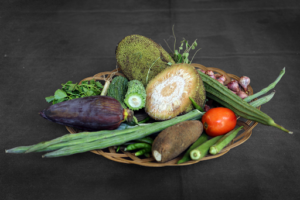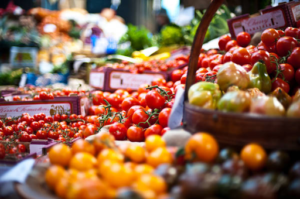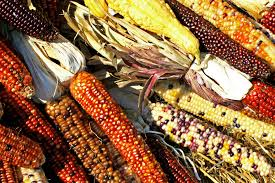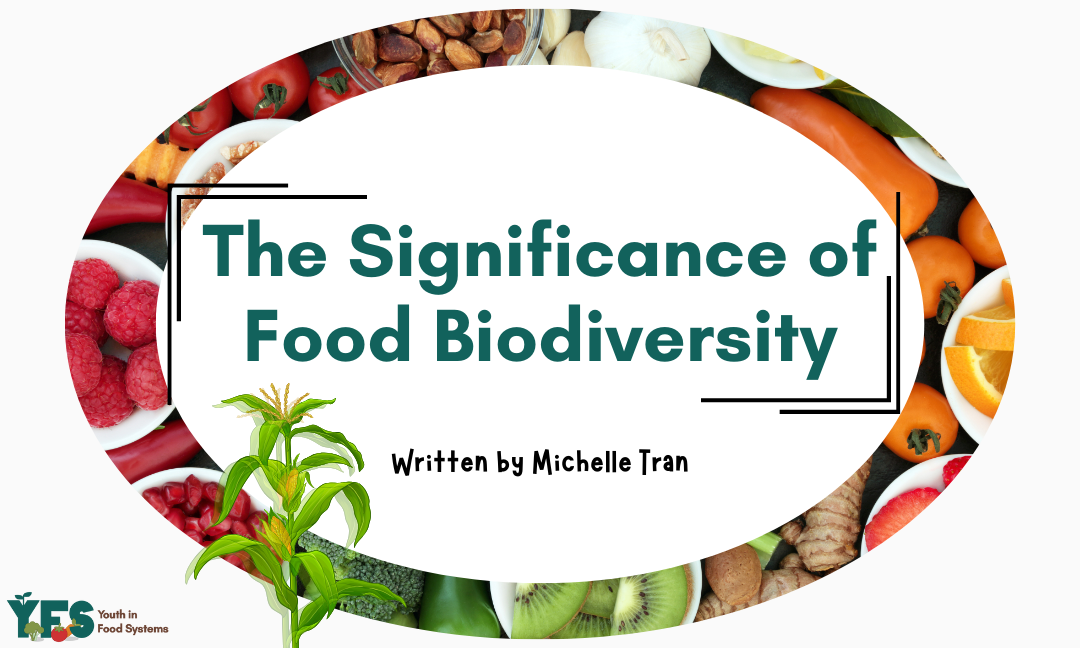Written by: Michelle Tran
Edited by: Avah Manu
Designed by: Eleanor Jeavons
Published by: Rayna Almas

An Introduction to Food Biodiversity
Biodiversity is the variety of plant and animal life on Earth. Biodiversity provides our environment with a variety of organisms, which is why we have so much diversity in living things. Food diversity is the reason we can split our foods into different categories including meats and alternatives, grains, vegetables and fruits, and dairy.
Biodiversity Loss
The loss of biodiversity does not only impact humans but also impacts ecosystems where our wildlife are found. It is crucial that we protect our biodiversity as our food systems depend on it.
 Believe it or not, our food systems are the main issue that result in biodiversity loss. Food production is responsible for a quarter of the world’s greenhouse gas emissions, widely impacting climate change. This further endorses biodiversity loss across the planet.
Believe it or not, our food systems are the main issue that result in biodiversity loss. Food production is responsible for a quarter of the world’s greenhouse gas emissions, widely impacting climate change. This further endorses biodiversity loss across the planet.
Demands for higher yields from farmers around the world have caused them to increase their use of pesticides and fertilizers which has also resulted in biodiversity loss (Zurich, 2023).
Another cause of biodiversity loss is overconsumption (World Bank Group, 2022). A popular human activity is buying more than what we need. With consumers leading the food industry, many unpopular foods are forced to be thrown out globally, which contribute to the yearly food waste. Additionally, 58% (35.5 tonnes/$49.46 billion) of all food is lost in Canada annually, while 32% of it could have supported Canadians (Second Harvest, n.d.). Buying what you need rather than what you want can help prevent food waste, and helps protect food biodiversity.
Why is Biodiversity Important to Humans?
There are many reasons why biodiversity is important to us, including:
- Biodiversity Supports Employment (especially in the food market).
- Protects the Planet’s Climate.
- Assists Food Chains: Our food chain has various kinds of food that we humans enjoy eating, but we need food biodiversity to have as much choice in what we eat.
 According to SlowFood (n.d.), 75% of edible plant species have become extinct worldwide. We must understand how this will negatively impact our food chains, and we must act to resolve this issue and defend the diversity of plants and animals.
According to SlowFood (n.d.), 75% of edible plant species have become extinct worldwide. We must understand how this will negatively impact our food chains, and we must act to resolve this issue and defend the diversity of plants and animals.
The Future of Biodiversity
With the conditions our environment is currently in, it is clear many more animals will continue to be affected by climate change and human activity. As the World Bank Group (2022) states, “Biodiversity is the planet’s wealth.” As more and more biodiversity is lost, the planet’s wealth decreases. Human activities affecting climate change will only continue to accelerate our planet’s biodiversity loss, and it is time to take action.
What Can We Do To Help?
The actions we can take to lower rates of climate change include:
- Changing Our Lifestyle: Try to live a more sustainable/zero-waste lifestyle.
- Advocating for Awareness: Alert family, friends, and community members about the issue and encourage them to go green.
- Volunteering: Offer to help out organizations advocating for climate change or food biodiversity (ex. Youth in Food Systems) and join them in making a change.
References
Biodiversity. (n.d.). Slow Food. Retrieved August 6, 2024, from https://www.slowfood.com/biodiversity/
How does biodiversity impact food security? | Zurich Insurance. (2023, January 13). Zurich Insurance Group. Retrieved August 6, 2024, from https://www.zurich.com/media/magazine/2021/food-for-thought-what-biodiversity-means-to-you
navigate_nextHome navigate_nextResources navigate_nextResearch The Avoidable Crisis of Food Waste. (n.d.). Second Harvest. Retrieved August 6, 2024, from https://secondharvest.ca/resources/research/avoidable-crisis
Securing Our Future Through Biodiversity. (2022, December 7). World Bank. Retrieved August 6, 2024, from https://www.worldbank.org/en/news/immersive-story/2022/12/07/securing-our-future-through-biodiversity

